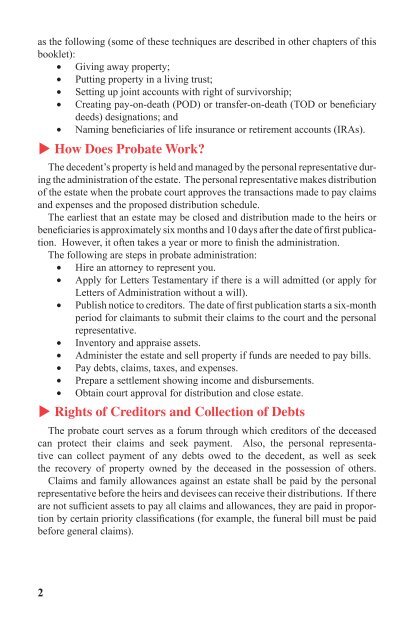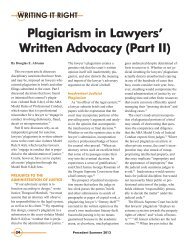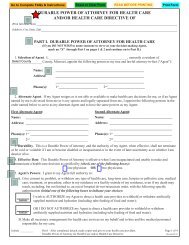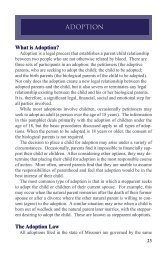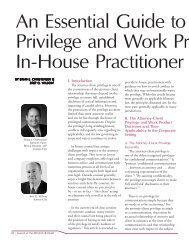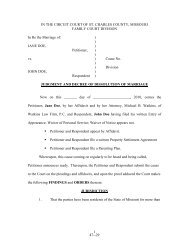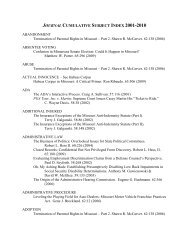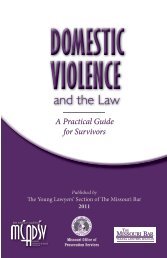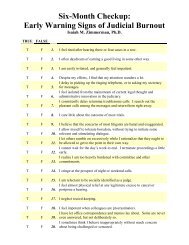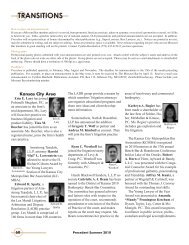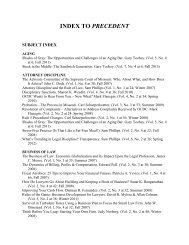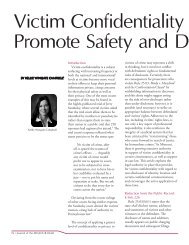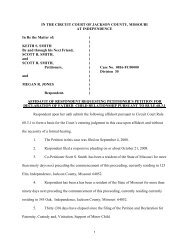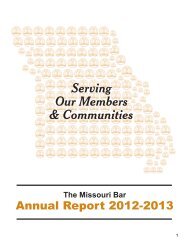Probate Law Resource Guide (PDF) - the Missouri Bar
Probate Law Resource Guide (PDF) - the Missouri Bar
Probate Law Resource Guide (PDF) - the Missouri Bar
- No tags were found...
You also want an ePaper? Increase the reach of your titles
YUMPU automatically turns print PDFs into web optimized ePapers that Google loves.
as <strong>the</strong> following (some of <strong>the</strong>se techniques are described in o<strong>the</strong>r chapters of this<br />
booklet):<br />
• Giving away property;<br />
• Putting property in a living trust;<br />
• Setting up joint accounts with right of survivorship;<br />
• Creating pay-on-death (POD) or transfer-on-death (TOD or beneficiary<br />
deeds) designations; and<br />
• Naming beneficiaries of life insurance or retirement accounts (IRAs).<br />
▼<br />
The decedent’s property is held and managed by <strong>the</strong> personal representative during<br />
<strong>the</strong> administration of <strong>the</strong> estate. The personal representative makes distribution<br />
of <strong>the</strong> estate when <strong>the</strong> probate court approves <strong>the</strong> transactions made to pay claims<br />
and expenses and <strong>the</strong> proposed distribution schedule.<br />
The earliest that an estate may be closed and distribution made to <strong>the</strong> heirs or<br />
beneficiaries is approximately six months and 10 days after <strong>the</strong> date of first publication.<br />
However, it often takes a year or more to finish <strong>the</strong> administration.<br />
The following are steps in probate administration:<br />
• Hire an attorney to represent you.<br />
• Apply for Letters Testamentary if <strong>the</strong>re is a will admitted (or apply for<br />
Letters of Administration without a will).<br />
• Publish notice to creditors. The date of first publication starts a six-month<br />
period for claimants to submit <strong>the</strong>ir claims to <strong>the</strong> court and <strong>the</strong> personal<br />
representative.<br />
• Inventory and appraise assets.<br />
• Administer <strong>the</strong> estate and sell property if funds are needed to pay bills.<br />
• Pay debts, claims, taxes, and expenses.<br />
• Prepare a settlement showing income and disbursements.<br />
• Obtain court approval for distribution and close estate.<br />
▼<br />
How Does <strong>Probate</strong> Work<br />
Rights of Creditors and Collection of Debts<br />
The probate court serves as a forum through which creditors of <strong>the</strong> deceased<br />
can protect <strong>the</strong>ir claims and seek payment. Also, <strong>the</strong> personal representative<br />
can collect payment of any debts owed to <strong>the</strong> decedent, as well as seek<br />
<strong>the</strong> recovery of property owned by <strong>the</strong> deceased in <strong>the</strong> possession of o<strong>the</strong>rs.<br />
Claims and family allowances against an estate shall be paid by <strong>the</strong> personal<br />
representative before <strong>the</strong> heirs and devisees can receive <strong>the</strong>ir distributions. If <strong>the</strong>re<br />
are not sufficient assets to pay all claims and allowances, <strong>the</strong>y are paid in proportion<br />
by certain priority classifications (for example, <strong>the</strong> funeral bill must be paid<br />
before general claims).<br />
2


